Peter MALONE
Saturday, 18 September 2021 19:25
Raw Wind in Eden
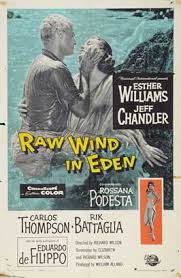
RAW WIND IN EDEN
US, 1958, 93 minutes, Colour.
Esther Williams, Jeff Chandler, Carlos Thompson, Rosanna Podesta, Eduardo de Filippo, Rik Battaglia.
Directed by Richard Wilson.
Raw Wind in Eden is an offbeat romantic melodrama - not well-received in its time, seeming more ludicrous later. After her successful career in M.G.M. musicals, with swimming interludes, Esther Williams made a number of dramas, The Unguarded Moment, The Big Show and this film. She has a strong and attractive personality with a comic touch. She is paired with Jeff Chandler who was in many romantic films at the time.
Filmed attractively in Cinemascope and colour, the film has a European cast including Rosanna Podesta, who had been Helen of Troy, comedian Eduardo de Filippo and hero, later character actor Rik Battaglia. Latin-American? Carlos Thompson completes the international cast.
The film is one of many written by Elizabeth and Richard Wilson and directed by the latter. It seems highly improbable - the kind of wish-fulfilment fantasy of women's magazines. There are the lyrical and romantic touches, the Americans isolated in idyllic Europe and local Italian violence. All in all an odd mixture.
1. The impact of the film? Romance, melodrama? Entertainment? The negative criticisms of the film on its release?
2. The importance of colour photography, the Mediterranean, the island scenery? Musical score?
3. The women's magazine stories - romantic heroes and heroines, affluence, Americans in Europe, the idyllic scenery? Stereotypes of Italians -romantic and violent? The melodrama?
4. The authenticity of characters and situations? Important or not for this kind of film? Audience suspension of disbelief?
5. Esther Williams and her reputation, the background of her musical comedy style? Swimming sequence? Laura and her work as a model, relationship with Wally Tucker, the plane crash? Surviving on the island? The encounter with Costanza and her father? The local politics and violence? Costanza and her love for the American Moore? Laura observing this? Her falling in love with Moor? Wally trying to repair the boat so that they can leave? Gavino and his jealousy of Moore and the attack? The violent chase over the island? Laura's discovering Moore's identity - and a happy future and new life!
6. Jeff Chandler as Moore - his strong silver-haired style? The romantic American hero? Presence on the island and mystery? His not communicating? Costanza in love with him? The jealousy of Gavino? The clashes with Wally? Attraction towards Laura, falling in love? The final chase and violence? New life?
7. Wally and his relationship with Laura? The crash? Stranded? The discovery of the yacht, the repairs, hostility towards Moore? His siding with Gavino against Moore?
8. Urbano and his place on the island, comic touches? The detail of life off Sardinia? Relationship with Costanza? His welcoming of Moore? Local customs? Lifestyle?
9. Costanza and her place on the island, her father? Her wanting to marry Moore? Gavino and his appearances, jealousy? Her jealousy of Laura?
10. Gavino and the Latin lover, violence, the shooting and the chase?
11. Romantic melodrama in spectacular setting? The world of popular romances and women's magazine values?
Published in Movie Reviews
Published in
Movie Reviews
Tagged under
Saturday, 18 September 2021 19:25
Rats
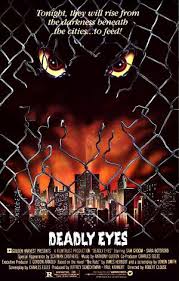
RATS
Canada/US, 1982, 93 minutes, Colour.
Sam Groom, Sara Botsford, Scatman Crothers, Lisa Langlois.
Directed by Robert Clouse.
Rats, as its name indicates is in the line of animal menace disaster movies. However, being made in the early '80s it was rather late on the scene and suffers in comparison. Willard in 1973 was one of the earliest films to exploit the horror of rats.
This film is directed by Robert Clouse, veteran director of action films as Darker Than Amber, Enter the Dragon, Golden Needles and Bruce Lee's The Game of Death films (which are featured in this film where teenagers are menaced in the cinema by the rats). The film is Canadian-financed and is set in a Canadian city. The cast acts competently - they are required to look afraid, puzzled and investigate the sources of political and financial corruption in the city which leads to its being infested by rats. There are some spectacular opening sequences with the burning of rotten grain. Scatman Crothers has a guest role - until he is demolished in the drains by the rats. There are some gruesome deaths accordingly.
With the mixture of romance, a father with a young son needing a mother and getting into danger and teenagers being pursued by rats, the usual themes of animal menace and audience fear are there. They have been set in a context of social comment - and the film's brief running time makes it a reasonable contribution to the genre but by no means original or memorable.
Published in Movie Reviews
Published in
Movie Reviews
Tagged under
Saturday, 18 September 2021 19:25
Ratboy
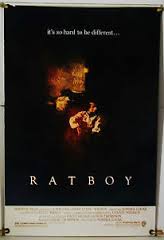
RATBOY
US, 1986, 105 minutes, Colour.
Sondra Locke, Sharon Baird, Robert Townsend, Gerrit Graham, Louie Anderson.
Directed by Sondra Locke.
Ratboy is an odd story - seemingly a mixture of Mask and Elephant Man with E.T. It was directed by Sondra Locke for Clint Eastwood's company. It is the story of a mutant living in a Los Angeles tip, and a brash and enterprising young window-dresser pretending to be a journalist and promoting him for her own gains. She also has eccentric brothers (played by Gerritt Graham and comedian Louie Anderson). Comedian Robert Townsend also has a role as the black man who helps them. There is a press conference and the Ratboy is horrified by his experiences in modern Los Angeles. He is finally a victim of police brutality - but escapes.
On paper the story might sound interesting - but it doesn't sustain this film, the experiences of Eugene the rat boy in Los Angeles don't seem to amount to much at all in terms of comment on contemporary society. An oddity.
1. The impact of the film? The rat boy as an alien type creature? Handicapped creature in the contemporary world?
2. Los Angeles, city and environment, atmosphere? Songs and score?
3. The plausibility of the plot? The Ratboy and his origins, the book from his mother, life in the tip? Nicky and her response? His experience of Los Angeles life and its glitz? His change of heart and Nicky's change of heart?
4. The introduction at the tip, the kids, the lights, Ratboy and his fear, the two sleazy kidnappers? The appearance of Ratboy, his being taken, held captive?
5. Ratboy and his origins, his name Eugene, fears? The treatment by Nicky and her brothers? Dressing, communicating, learning? His enjoying dancing? Social life? His fears, on the skyscraper ledges? Running away? With Manny in the car? The build-up to the press conference, his training for his speech? Television, interviewers? The escape, the police chasing? His being shot? Escaping through the hole, hiding in the tree, signalling to Nicky? Going off for his own life?
6. Nicky and her brashness, pretence, pushiness with the kidnappers, her deal, training him, with Manny, her brothers, the socials? The build-up to the press conference, the introduction? The chase, Nicky being hurt, her change of heart? Her understanding what she had done?
7. Manny, his help, the comic style, the car rides, friends?
8. The awkward brothers, their helping their sister, with Eugene, friendship, hurting him, saving him?
9. The press, the curiosity, the press conference? The police, their quickness with guns?
10. An enjoyable portrait of strange creature? of exploitation? A fable about the pressures of life in the contemporary world?
Published in Movie Reviews
Published in
Movie Reviews
Tagged under
Saturday, 18 September 2021 19:25
Rapture
.jpg)
RAPTURE
UK/France, 1965, 104 minutes, Black and white.
Patricia Gozzi, Dean Stockwell, Melvyn Douglas, Gunnel Lindblom.
Directed by John Guillermin.
Rapture is an unusual and stylised melodrama, a British-French? co-production, directed by British Guillermin. Guillermin had a career in the '50s and early '60s in England with small-budget films and then productions like The Waltz of the Toreadors with Peter Sellers. At this time he made The Blue Max and then moved to Hollywood with many action adventures and by the mid-'70s made such films as Towering Inferno, King Kong and Death on the Nile.
The stars of this film are an international group and bring excellent talent to the contrived story - Melvyn Douglas had just won his Oscar for Hud and is a persuasive character actor. Dean Stockwell had just made Long Day's Journey Into Night and can portray vulnerable hunted people. Patricia Gozzi had made Sundays and Cybele and Gunnel Lindblom had featured in several Ingmar Bergman films including at this time The Silence. The film is a study in an isolated group interacting with passion and with violence. The film's title has the ambiguity of wonder and violation and this indicates the tone of the film.
1. The significance of the title? Indications of wonder, of rape and violence? The ambiguities indicating themes?
2. The presentation of the French setting - how particularly French was the film? Universal in the symbolic characters and
symbolic situation?
3. The black and white photography, the use of locations, the importance of the musical score? An enclosed world, the town, the house? The landscapes and the sea? Home, an alien landscape, a landscape ultimately of destruction and the need for escape?
4. The presentation of a family and relationships of love, hatred, intensity, power & domination? The images of tension? Masks and images?
5. The portrait of a girl growing up? Her being stunted in her development by the family, her father? The symbolism of the dolls and her love for them? Agnes as a doll? Living in a dolls' house? Her fears, her madness? The indications of her sexual growth? Her capacity for love? Her responsibility and accepting and coping with herself? Her adjustment to the real world, the transition from the world of fantasy?
6. The opening and the introduction to the characters - the four in the car, tensions, relationships? The background of the wedding? Fear?
7. The portrait of Agnes - a young girl, attractive, quiet, retarded? The influence of her father, mother? The ironies with the revelation about her mother? The importance of the dolls and her playing with them - fantasy and reality? The scarecrow and its reality, symbolism? Josef and the fulfilment of the scarecrow? Sexuality and the influence of Karen? Josef and his intrusion on her life, her seeing him from the point of view of fantasy? Tenderness, love and the dolls? The asylum and the build-up to the killing of Karen?
8. The relationship with Josef? Her leaving, her bewilderment in the town, her return?
9. The occasion of Josef's death? The pursuit? The grief? What impact did he have on Agnes? The quality of love? His working for her?
10. The portrait of Agnes' father - as an old man, his qualities, weaknesses, harshness? His story? A solitary man? His love-hate attitudes towards his daughter? Treatment of her? His relenting? Hostility towards Josef? His anger, sheltering him?
11. Karen and her place in the household, a sensuous woman, type, helping, leaving? Her influence in the household, on Agnes, on Josef?
12. The accident of Josef's coming into their lives, the relationship to the scarecrow, Agnes and her infatuation, looking after him, going away with him? The contrast with Karen's attitude? The father and the book?
13. The sexual relationship, the lyrical tone given these sequences? The symbolism of the dolls?
14. What made Agnes go away with Josef? Work, apartment, money, her fear in the town, inability to cope? The inevitability of her return?
15. The ironies of her return - and the attitude of her father? The irony of Josef's return and death?
16. The tension build-up with the final chase, the fall, Josef’s death and final words?
17. A blend of the passionate and the lyrical, the sensitive? How well did the film communicate its atmosphere, characterisation, thews?
Published in Movie Reviews
Published in
Movie Reviews
Tagged under
Saturday, 18 September 2021 19:25
Rancho Notorious
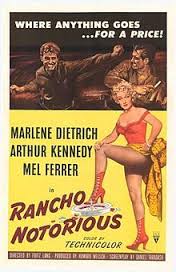
RANCHO NOTORIOUS
US, 1952, 89 minutes, Colour.
Marlene Dietrich, Arthur Kennedy, Mel Ferrer, Jack Elam.
Directed by Fritz Lang.
Rancho Notorious is a well-made Western, rather harsh in its presentation of the West. The only really pleasant character is brutally murdered at the opening of the film. It is designed as a 'Ballad Western'; the song during the credits, 'The Ballad of Chuck a-luck', recurs throughout the film as a chorus to the action. Its theme is "murder, hatred and revenge". Directed by Fritz Lang, famous refugee-German director (his earliest films date from the 1920's), the film traces a cowhand's search for his fiancee's murderer. This search leads him to dance-hall singer, ageing Altar, played by German refugee actress, Marlene Dietrich - and the film is something of a showcase for Miss Dietrich.
The tone of the film is severe, characterised by the snarl frequently on Arthur Kennedy's lips as he doggedly tracks down the killer for revenge. Western law also comes up for consideration, and the question of who is responsible for applying justice to criminals in a frontier west. There is plenty of action in this western with a difference.
1. What is the effect of the ballad with its refrain of "murder.. hatred and revenge".. as it is repeated during the whole film and as it ends it? How is this film a cinema ballad?
2. The murdered girl appears only momentarily at the beginning of the film. How does the director impress her and her goodness on the audience so that her fiance's seeking revenge will make sense?
3. Why did the hero seek revenge by himself? Was he entitled to do this according to law? What legal justification of his action did he think he had?
4. Were your feelings strangely aroused in his favour at the time of the killing? Why? Were you on his side for the revenge? Why?
5. Was Marlene Dietrich's role as Altar a typical Western cliche and a typical piece of Dietrich acting - (e.g. 'Go out of my life and come back ten years earlier') - or was Altar a well-presented and well-drawn character in the film?
6. What was the purpose of the scene in the saloon where Altar is fired and then tries her, fortune at the 'Chuck-a-luck' wheel?
7. Why did Altar run 'Chuck-a-luck'?
8. Did you believe that the hero really loved Altar at any stage?
9. What did you think of the hero's tactics at 'Chuck-a-luck' as he tried to trace down the killer?
10. Do you think the hero acted legally and morally as he challenged the murderer. and during the gun battle?
11. Did you believe in Altar's turning over a new leaf after the hero had thrown her life in her face; or was it artificial? What about her death?
12. It is said that the film was badly constructed; it started out as a story of a murder. hatred and revenge and then began to be interrupted by lengthy flashbacks about Altar which digressed from the main line of the film. Do you agree?
Published in Movie Reviews
Published in
Movie Reviews
Tagged under
Saturday, 18 September 2021 19:25
Ransom/ 1977
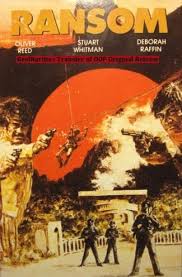
RANSOM
US, 1977, 90 minutes, Colour.
Oliver Reed, Deborah Raffin, Stuart Whitman, John Ireland, Paul Koslo.
Directed by Richard Compton.
Ransom is a tough thriller, directed by Richard Compton (Macon County Line, Return to Macon County). While it has some interest A social issues (big businessmen and land deals) and some Indian traditions (the vengeful hero using Indian warrior techniques), the film is generally a colourful actioner which stays with action rather than theme. Oliver Reed seems an unlikely choice for the tough private detective. Stuart Whitman is much more convincing as the obsessive businessman. The supporting cast is quite strong and includes Deborah Raffin and John Ireland. Paul Koslo, a villain in so many films (especially with Charles Bronson) is the most convincing of all.
It could have been a much more successful and thoughtful film.
1. The impact of this kind of thriller? Tough, action, violence? Crime? Big business? Indian traditions?
2. The emphasis on technical flair: chases, cars, helicopters? Action sequences and battles? Colour photography, locations? Dramatic score?
3. The title and its focus on Victor? His quotation from Indian myths? Themes of ownership of the land, big businessmen and their deals?
4. Oliver Reed as an American private detective? His tough, bullish image? Tough manner, relationship with Whitaker? His relationship with Cindy? His work on the case, skill at detection, confrontation of Victor? the chases, the massacre, the helicopter flight? The irony of. his absconding with the money and Cindy? A cynical hero?,
5. Whitaker and his associates? Wealth,, society background, contacts with the police? Corruption and manipulation? Whitaker's obsession? His finally going after Victor? His death?
6. Victor and his impact? Motivation? The quotations? Picturing him as an Indian warrior? The background about his sports achievement? His holding the wealthy to ransom? His moving in their world? In his own warrior world? The killings, the police station? The chases, the motor bike? His surviving in the hills? The confrontations? Whitaker? His death?
7. The police? The chief and his contact with Whitaker? Manipulation? Supporting Nick?
8. Cindy as reporter, contact with Nick, unscrupulous? The final cynical leaving with the money?
9. The blend of action sequences, theme, thriller techniques? Typical action entertainment of the '70s?
Published in Movie Reviews
Published in
Movie Reviews
Tagged under
Saturday, 18 September 2021 19:25
Ramona
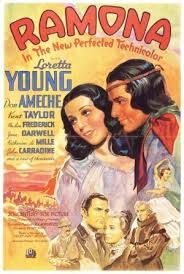
RAMONA
US, 1936, 90 minutes, Colour.
Loretta Young, Don Ameche, Kent Taylor, Pauline Frederick, Jane Darwell, Katherine de Mi11e, John Carradine.
Directed by Henry King.
Ramona is the fourth film version of the celebrated late 19th century novel Ramona, by Helen Hunt Jackson, an author concerned about Indian rights.
The treatment is attractive though very stilted. It was chosen by 20th. Century Fox for its first Technicolor production. The emphasis is on the attractive Californian scenery and the 19th. century settings. The story, as presented by the film) is fairly straightforward, even trite. Ramona, played pleasantly by Loretta Young, seems to be the adopted daughter of a wealthy Spanish-American? family. In fact, she is part Indian. The matriarch of the household has adopted her but does not want her to marry her son Felipe (Kent Taylor). mischief is made, especially by a jealous Indian maid Margarita. However, the romance comes in the form of Don Ameche (in his second film) as the Indian Alessandro.
There are attractive scenes of the hacienda, the arrival of the Franciscan friar and his welcome, riding sequences. Felipe is injured and Alessandro and Ramona take him, despite his mother's wishes, out into the open air. Margarita makes mischief. Ramona finds out the truth about herself and leaves. She marries Alessandro and they live happily on a fari2, have a child. There is a tragic denouement - in the form of John Carradine. Alessandro hurries to get the doctor for his son, but the doctor, very busy in the town, has to plead that he can't leave one hundred for one. Alessandro takes a farmer's horse - and he is pursued by the farmer and shot.
There is a plaintive score by Alfred Newman.
The film shows the situation in California with the Spanish, the Americans, the Indians. There is sympathy for the plight of the Indians and the arrogance of the Spaniards. However, the film has dated and is of mainly historical interest.
Published in Movie Reviews
Published in
Movie Reviews
Tagged under
Saturday, 18 September 2021 19:25
Raising Daisy Rothschild/ The Last Giraffe
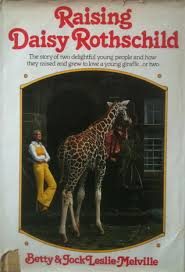
RAISING DAISY ROTHSCHILD (THE LAST GIRAFFE)
UK, 1979, 120 minutes, Colour.
Susan Anspach, Simon Ward, Gordon Jackson.
Directed by Jack Couffeur.
Raising Daisy Rothschild is a pleasant pro-conservation film. It bears strong resemblance to Born Free and the other Virginia McKenna-Bill? Travers films: Ring of Bright Water, An Elephant Called Slowly. In fact Ring of Bright Water was directed by the present film's director, Jack Couffer (director of The Darwin Adventure). Based on a book by the husband and wife team portrayed in the film, the emphasis is on the preservation of giraffes, specifically the Rothschild giraffes in Kenya. Susan Anspach plays with some vivacity the photo-journalist-turned conservationist. Simon Ward, rather restrainedly and genially, plays the polio-affected hero.
Gordon Jackson has a very good role as an animal poacher. The film's screenplay runs along predictable enough lines - but it is quite well done and the presentation of the giraffes and the African scenery is attractive. The film joins the Born Free group in alerting audience attention to the world's animal heritage.
1. An interesting and entertaining film? The presentation of Jock and Betty and their work in Africa? The presentation of the giraffes and wildlife? The Rothschild giraffes?
2. Colour photography, Nairobi and the Kenyan locations? The atmosphere of Africa, homesteads, poachers, the open fields and the animals? The interaction of the animals in their environment? Special effects for the animal sequences? The musical score?
3. The Born Free tradition of husband and wife looking after animals? How well did this film compare with Born Free and the others? Entertainment, message? How persuasive?
4. The film is based on real life? Betty and her arrival in Africa, American background, divorce? Her photo-journalism - and the humour of the encounter at the airport and her declaring her amateur status? Her taking photographs, the initial encounter with the poachers and Ian Fielding? The encounter with Jock? Her being caught up in the atmosphere? Her interest in the baby giraffes? Her antagonism towards Fielding? Jock's friends, the officials in Nairobi? Her growing involvement - and emotional attachment? The safari with Jock? Falling in love with him? The marriage - in the traditional African style? Her throwing herself into the African life? Preservation off the giraffes? Clashes with Fielding? The encounter with guard 1 - with the background of his family? Her clash with him - and her being in the wrong? The qualities of the marriage. interaction with Jock? Support for him - and his lame arm? The decision to drove the animals and collect them? Her contribution to the preservation of the giraffes? The effect of her experience in Africa, awareness of the animal heritage?
5. Jock as hero - his background in Africa - his sense of belonging, his awareness of the changes in the '70s - political, racial-Friendship with Fielding and membership of the club yet differing in values? His farmer friends? The prospect of farms and the dying out of the animals? Safaris and guiding people? Falling in love with Betty? The wedding and its effect on him? Setting up house? The decision to save the animals? The tending of Daisy and its effect on Betty, her pampering it like a child? The comments on animal and humans? His decision to help in the droving of the giraffes - and the opportunity for some heroism despite his arm?
6. Ian Fielding as villain - Gordon Jackson's suave rugged style? The initial encounter and his lies, the encounter in the clubs? His antagonism? His racial and political attitudes? His opposition as regards the giraffes? His hold over Kamil? Kamil's returning to him and the final confrontation and Fielding killing him? The points made through Fielding as villain?
7. Kamil and his talent as a poacher? Work for Fielding? His wife and the many children? Seeing them in the village? His justifying his trust with Betty and Jock? His skill in tending the giraffes? His seeming hurt of Daisy when she left? Betty's irrational anger? His returning to Jock - and the pathos of his death? Reconciliation with Betty?
8. Jock's friend and the prospect of the farm, his being injured, his support for the droving? The discussion with the authorities in Nairobi?
9. The collage of sequences with the looking after of Daisy? Audiences sharing Betty's and Jock's sentiments? The decision to help preserve the giraffes?
10. Themes of conservation, nature, the animal heritage? The importance of the balance of nature? Decisions affecting poaching, transition of land for farming? The humanising of animals? The impact on the wide audience?
Published in Movie Reviews
Published in
Movie Reviews
Tagged under
Saturday, 18 September 2021 19:25
Raise the Titanic
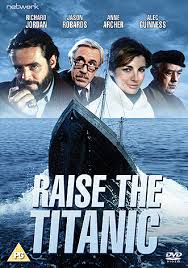
RAISE THE TITANIC
US, 1980, 114 minutes, Colour.
Jason Robards, Richard Jordan, David Selby, Anne Archer, Alec Guinness.
Directed by Jerry Jameson.
Raise The Titanic was a breathlessly-written multi-plotted bestseller of adventure and international intrigue. Streamlined (perhaps overmuch) for cinema purposes, this version focuses on the basic issues of a rare radioactive metal in the hold of the Titanic and the feat of raising it - in well-done sequences. Director Jerry Jameson's major previous effort was Airport 77 which surpassed soap opera when the engineering sequences got under way. But a lot of the pace and vitality are gone - the leads (except for Jason Robards) become rather bland types (though Alec Guinness has five minutes' worth of character sketch) and the film is another of
Lord Grade's lavish entertainments that are O.K. but only so so.
1. An enjoyable and interesting movie? Action spectacle? Adaptation of a big bestseller? The financial and critical failure of the film - deserved or not?
2. The elaborate production, Malta locations and special effects? Underwater photography? The technology of raising the Titanic? Panavision and colour photography? The cast?
3. The adaptation of the novel - and the streamlining of it? The remainder of the core elements - and the criticism that everything else, including characterisation,, was bland?
4. The mystique of the Titanic - its maiden voyage, passengers, accident and sinking? The technological aspects of raising the Titanic? Its contents? The film's emphasis on the engineering and the raising - and showing it twice? An enjoyable highlight of the film?
5. The political background - the Navy and the Sicilian project, the aims of the project for the nuclear situation? Admiral Sandecker and his commitment to it., Seagram and his advice? Scientists and their projects, plans, needs? The defence capability and the attack capability? The need for special minerals? Final options and the moralising of the ending?
6. The background of adventurers - the early miners in Russia with finding the byzanium? The information about the past, their escape and deaths in England? Contemporary adventurers - the opening sequence in Russia? Pitt and his explaining what had happened? Pitt as the modern adventurer -with money and resources at his disposal?
7. The discovery that byzanium was in the Titanic, the need for raising the Titanic, the presentation to the President and the need for money? Sandecker and his hesitations but backing the project? Seagram and his advice? Pitt and his abilities? The information given for locating the Titanic and the sequences of trying to find it? The various technical pieces of information and the way they were communicated to the audience? The calculations and the ultimate success - the atmosphere of discovery of the Titanic?
8. The international espionage background - spies in the United States, the use of leaks in newspapers, sabotage. the Russian presence at the raising of the Titanic,. the submarine preventing the Russians claiming salvage rights? The pressures to raise the Titanic early?
9. How plausible was the search for the ship, the techniques used for raising it? The irony of the docking in New York and the failure of the search?
10. The importance of the characterisations - subordinate to the action? Sandecker and his project, influence with the President, patronage of the search? Seagram and his relationship to Dana, his commitment to the project, clashes with Pitt? Pitt and his relationship with Dana? Clashes with Seagram, taking control, skills? their final collaboration to find the Byzanium?
11. The incidental sequences in Pitt's visiting Cornwall - the encounter with Brigalow? Alec Guinness in the part? His description of the Titanic, his contribution to the search? The flag and the raising of the flag? The return to Cornwall and the final decisions?
12. Audience agreement with the anti-nuclear stance of the ending?
13. The value of the film as big entertainment? Its probability and implausibility? Adventure? Adult matinee material?
Published in Movie Reviews
Published in
Movie Reviews
Tagged under
Saturday, 18 September 2021 19:25
Raintree Country
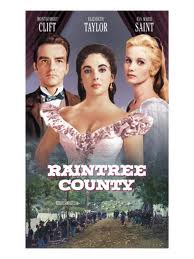
RAINTREE COUNTY
US, 1957, 166 minutes, Colour.
Montgomery Clift, Elizabeth Taylor, Eva Marie Saint, Nigel Patrick, Lee Marvin, Rod Taylor, Agnes Moorhead, Tom Drake.
Directed by Edward Dmytryk.
Raintree County is a cousin to Gone With The Wind. It was made in the mid-fifties and featured Elizabeth Taylor at one of the peaks of her career. The film is very enjoyable although it doesn't reach the heights of Gone With The Wind. It re-creates the atmosphere of America prior to the Civil War, the differences between North and South, and focuses attention on the rich society belle - and then brings in the race problem. Montgomery Clift is the very intense central character who has a vision for life and is frustrated throughout his life. Elizabeth Taylor was nominated for an Oscar for her performance. There is some unusual casting in supporting roles, for instance Nigel Patrick in an American film, and Rod Taylor in an early performance. Raintree County is long, sprawling, based on a best-seller and is the kind of material that appeals to a wide audience.
1. The importance of the title and its meaning, as used in the film? Pride, identity, belonging etc.?
2. The use of the raintree as a symbol? How well used, for a journey, a hero and his quest, what happens to a hero on his journey, his adventures, downfall and sins? The myth of the Raintree as explained? What tone did it give the film, what meaning? (The suitability of the theme song for this theme?)
3. How important was the American background for this film? The film as a piece of Americana? The American heritage, the 19th century way of life and heritage. the Civil War and its impact and changing of people's lives? The nature of heroes, their potential and the potential failure? The sadness and the happiness in life? Dreams and shattered dreams?
4. Comment on the picture of pre-Civil War America: Freehaven, the significance of its name, the leisure of manners and learning, the ideals presented in learning, romance, schools, picnics, books, marriage and careers? The irony of the shattering of these dreams throughout the rest of the film?
5. What was the role of the professor in the film? Moulding the minds of the young people of Freehaven? His own inconsistent behaviour? His leaving the people with some disillusion? His re-appearances during the film as a kind of ironic comment on behaviour? The professor as the elegant opportunist? A product of America in the 19th century? The ideals not lived up to?
6. How important for the atmosphere of the film was the graduation ceremony, the challenge of the race, the drinking, the change for the lives of all the people?
7. How attractive a hero was Johnny? The typical American hero, the idealist, wanting to be someone, capable of being someone, the poet and the seeker after meaning? The irony of the shattering of his dreams? The influence of Nell on his life, of Gar, the professor, his home life? His participation in the race, and the change that this effected in his life?
8. The character of Susanna: from the south and all that this signified, the mystery about her, her arrogance, her wealth, her attractiveness, the potential madness and selfishness'. Her tricking of Johnny. clutching at him, hurting Nell etc.? What kind of person was she? How cruel? What was audience response to her? Did it change throughout the film:
9. The importance of John and Susanna's marriage? Based on trickery and Susanna's clutching at love? Johnny's not loving her but trying to be honourable? The discovery of the truth? The hurt for Nell? John as an upright man who is prepared to make his marriage work, the growing in love.. supporting Susanna, searching out the truth about her? The importance of the sequence with the southern relations? Susanna's revisiting her home and the ghost of the past? What potential did he have to succeed, despite the marriage: The significance of the return, his work in the school? The contrast with Gar and his opportunism? The importance of setting the slaves free? His jog of fatherhood? How far did he get on the road to being someone?
10. The importance of the Civil War: the south, slaves. the enclosed world, madness. the complex truth behind Susanna's story and ghosts? The racism and the inbreeding? This aspect of the American heritage?
11. Why was this too much for Susanna? Pursued by the ghosts, flying, seeking some kind of exorcism. taking her child, her time in the asylum? The possibilities for some kind of healing? This strain in American history?
12. How well did the film portray the war and its impact? Lincoln and his ideals, Johnny's participation and search for Susanna, the battles, the length of time of the war, death, the importance of the battles, Lee Marvin's companionship and death, the finding of Susanna? How did the war change people's lives? (Gar and his relationship to the war, the continued opportunism?
13. How did the future become much better after the war? The invitation to politics, the influence of Nell and her acceptance of the situation, with her love? The challenge to Gar?
14. How plausible was Susanna's sacrifice of her life? Was this inevitable? How had she changed? What kind of life had she lived, how much happiness?
15. How satisfying was the end? Was such happiness possible? - the irony of showing what might have happened but did not?
16. What were the main themes of the film: as regards America, ideals, heroes, the relationship between men and women? Racism, politics, idealism and opportunism?
Published in Movie Reviews
Published in
Movie Reviews
Tagged under